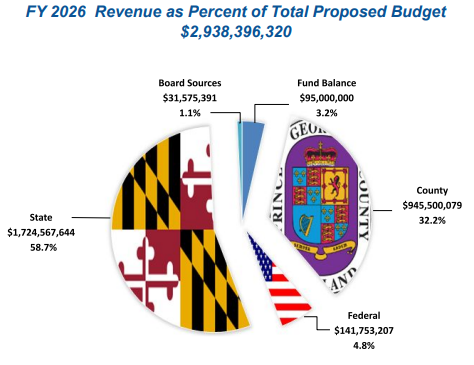
On April 1st, the PGCPS community received an email from Superintendent Millard House II outlining unexpected changes to the budget. According to the email, the U.S. Department of Education has taken back pandemic reimbursements totaling 400 million dollars across the entire state. PGCPS will be among the 4 school districts most affected by this change. Additionally, the proposed budget for 2026 has 70 million dollars less in federal funding compared to the 2025 budget, due to decisions at the federal level.
According to the Superintendent’s email, the pandemic “funds have supported key services for students — including mental health care, vaccines, technology, building upgrades, teacher training, and programs to help students recover from the effects of the pandemic.” Due to the drying up of these funds, all of these programs have been immediately halted with no allocated budget. The county will now have to make tough decisions about which programs are the most pertinent to student well-being and educational resources. The termination of these funds creates a predicament for the county; services that were purchased under the expectation of reimbursement now have to be paid for without outside assistance.
The proposed PGCPS budget for SY2026 has 70 million dollars less of federal funding compared to 2025. This reflects the approach of the new administration towards education. President Trump has repeatedly made clear his disdain for federal involvement in public education and his view that government funds should be allocated elsewhere. Trump’s new budget proposal will cut the Department of Education’s budget by 15 percent, a department that he has wanted to eliminate. Linda McMahon, the education secretary, has said, “The federal government has invested trillions of taxpayer dollars into an education system that is not driving improved student outcomes. We must change course and reorient taxpayer dollars toward proven programs that generate results for American students.”
The potential cutting of these programs could have a huge impact on students’ personal success. Students nationwide have increasingly reported poor mental health, per the CDC. Twenty percent of students have reported thoughts of suicide, and nine percent have attempted suicide. Despite this bleak situation, studies have shown that positive relationships with teachers and mental health resources in school can ameliorate mental health struggles. Therefore, cutting mental health problems could have extremely detrimental effects on students and should be considered highly salient in future budgeting.
Roosevelt students are feeling nervous about the future of public education in high school and the collegiate realm. Sophomore Nicolas Coman, when asked if he felt personally worried about college, answered, “Absolutely. All of the colleges I’ve been looking at have come under fire by the administration.” Junior Aldrich Magpali feels similarly, stating, “I’ve always been worried in general about paying for school since I have a low income background, and now it’s way more stressful because of the cuts to federal funding.” These sentiments are shared by many and have created a cynical attitude around the schooling system and its future. Magpali encapsulated it, saying, “The [Trump] administration is trying to keep people from learning and becoming educated. I can’t even think of a single benefit that could result from the removal of funding towards education.”

